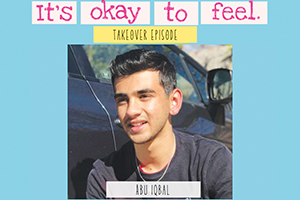A top goal is to stem distress related to cultural trauma
By JULIE MINDA
In a podcast posted by the Orange County, California, chapter of the National Alliance on Mental Illness, high school senior Abu Iqbal describes going through dark periods when he felt his life was meaningless. His relationships suffered. His grades fell. He thought about suicide.
He says in the Feb. 15 podcast, created for the "It's Okay to Feel" NAMI podcast series, that he's emerged from that dangerous period and wants to share his path, especially the importance of reaching out for help.

Abu Iqbal, a high schooler in Southern California, created a podcast on suicide prevention after he took a training on the subject offered by Dignity Health – California Hospital Medical Center in Los Angeles. To listen, go to namioc.org/podcast-episodes.
He got crisis counseling through the 741741 mental health texting service and tapped into other free resources for guidance on how to approach his mental health and develop coping strategies. He opened up about his struggle to loved ones. He participates in a support group. He's also embracing a new purpose — to help others. He devotes much of his podcast to explaining how people can spot mental health distress and signs of suicidality in others, and how they can assist the sufferers.
Iqbal gained the skills and knowledge to educate others through his participation in a virtual mental health training program called QPR, or "Question. Persuade. Refer." A coalition that includes Dignity Health's six Southern California hospitals, the UniHealth Foundation and Southern California school districts and mental health service providers is enabling thousands of community members to take part in QPR and similar training to promote mental health awareness and positive early intervention.
Youth of color are a particular focus of the effort. Evidence shows they are at heightened risk of mental health concerns, in part because of the impact of cultural trauma.
Stress-related illness
Carly Goldblatt, who manages youth mental health programming for Dignity Health –
California Hospital Medical Center in Los Angeles, says "mental health training and education are needed now more than ever," given that stress related to pandemic impacts and racial tensions over the past year have overlayed preexisting traumas for many vulnerable people and populations.

Goldblatt
In a press release on the Los Angeles-area coalition's work, Dr. Lynn Yonekura, director of community health for Dignity Health — California Hospital Medical Center, says issues including poverty, racism, adverse childhood experiences and violence can have a profound effect upon physical and mental health and well-being for minority community members. "We know that trauma and mental health issues can contribute to stress-related illnesses, such as mood and anxiety disorders, substance use disorders and suicide," she says.
She adds that linking youth to mental health resources is one way the coalition is helping schools to decrease the suicide rate. Improving access to mental health support has been shown to reduce disciplinary referrals and absenteeism and increases on-time graduation.
Multiplier effect
The coalition's programming is funded by a $4 million, three-year grant that began in November 2019. The nonprofit UniHealth Foundation is providing $1.9 million and Dignity Health, part of CommonSpirit Health, the remainder. The initiative is called "The Cultural Trauma and Mental Health Resiliency Project."
Eleven mental health and social service organizations in Los Angeles and San Bernardino counties are using the grant dollars to provide trainings in Mental Health First Aid, Youth Mental Health First Aid and QPR. Mental Health First Aid and QPR are established training programs that have been offered in communities nationwide. QPR got started around 1999, Mental Health First Aid has been offered in the U.S. since 2008, and Youth Mental Heath First Aid since 2012.
The training from the Southern California coalition began with in-person coursework then switched to virtual presentations with the onset of the pandemic.
The instructor training is primarily for staff of the six hospitals in the Dignity Health Southern California Service Area as well as for staff at grantee organizations. In 2020, 191 people received instructor training, and they in turn provided training in Mental Health First Aid, Youth Mental Health First Aid or QPR to 3,137 community members.
Those trained so far include nonprofit staff, teachers, coaches, parents, mentors and students who interact regularly with minority youth in Los Angeles and San Bernardino counties. All the trainings are offered at no cost to participants. Many of the newly minted instructors are locals who are of the same ethnic or racial background as the participants who take part in their trainings on Mental Health First Aid, Youth Mental Health First Aid and/or QPR.
Goldblatt notes that for the purposes of the grant work, the coalition does not have a hard and fast definition of "cultural trauma," but the group is "more so recognizing and addressing racial, ethnic and cultural needs of individuals, while also addressing" trauma associated with adverse childhood experiences, violence, poverty, racism and similar stressors. Suicidality and substance abuse are covered in all three courses.
All three training modules — the Mental Health First Aid, Youth Mental Health First Aid and QPR — are rooted in the concept that even people with no expertise in mental health can learn how to identify the signs of mental health distress, engage the person who is suffering and refer that person to experts and/or organizations that can assist. This can include therapists and social workers at the 11 grantee organizations, suicide hotlines, crisis text lines and the American Foundation for Suicide Prevention. According to the American Psychological Association, approaches including providing individual therapy, family support and school-based services can be effective in addressing mental health disorders in children.
Worsening stressors
Saraijah Barnes is a mental health instructor with the San Bernardino-based Making Hope Happen Foundation, one of the nonprofits involved in the coalition. She's been trained as an instructor in both Mental Health First Aid models and in the QPR model and has presented curriculum from these three models to upwards of 750 community members. She says, "I am Black, and I know that the issue of mental health most definitely touches upon my community."

Barnes
She says the mental health issues that had loomed large before the pandemic in Black and brown communities have been amplified over the past year. The San Bernardino community that her foundation serves has been hit hard by pandemic impacts. "It's all correlated — there's the distress connected with losing jobs and homes (as lockdowns hamper local economies) and the distress of losing family members and community members (to COVID-19). This is traumatic, and we note that this has emotional, mental and psychological impacts," including on young people.
According to the coalition, calls to mental health crisis lines in Southern California have increased by up to 8,000% since March 2020.
Reducing stigma
Goldblatt says it's important to have this training rolling out among community members because traditionally there has been much stigma around mental health issues in minority communities. She hopes the training will decrease the level of stigma and negative effects of trauma.
Iqbal, the high schooler who created the podcast after attending the training, says many in the Muslim community are reluctant to talk about mental health as well. Unspoken and open hostility and violence toward Muslims have made Iqbal hypervigilant in public places, stoking anxiety. Also, as a Muslim of Pakistani descent, he says he labored under cultural expectations for academic excellence that caused performance anxiety at school.
He took the mental health training course after a classmate in his Southern California high school died by suicide. That death made it clear to him that other people were silently suffering, and it compelled him to learn more about his mental health challenges, and how to seek help and aid others in doing so.
Pediatrician academy warns of threats to minority youths' mental health
In March, in its AAP News, the American Academy of Pediatricians said the pandemic has put youth at increased risk of emotional and behavioral health concerns and it advised parents and guardians "to be aware of loneliness, isolation and uncertainty in children and identify emotional and behavioral responses and needs in the context of typical development."
The AAP says the pandemic has exacerbated existing disparities among children and families with emotional and health challenges and that "appropriate allocation of resources is necessary to address the pandemic's impacts, particularly for under-resourced communities, populations facing inequities, children and youths with special health care needs and children in child welfare and juvenile justice systems.
"The impact of racism, including structural racism on the emotional and economic well-being of families of color cannot be overstated," according to the organization's guidance.
— JULIE MINDA